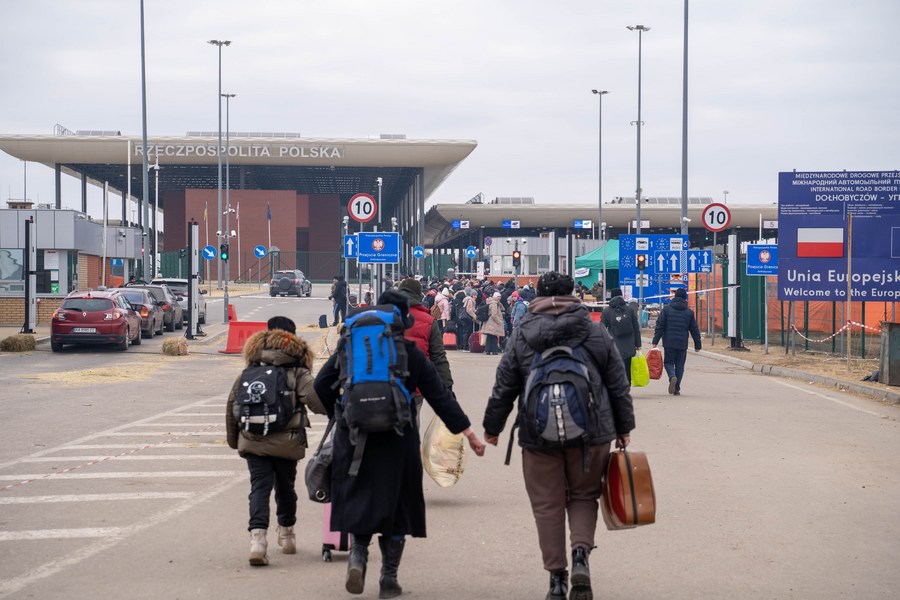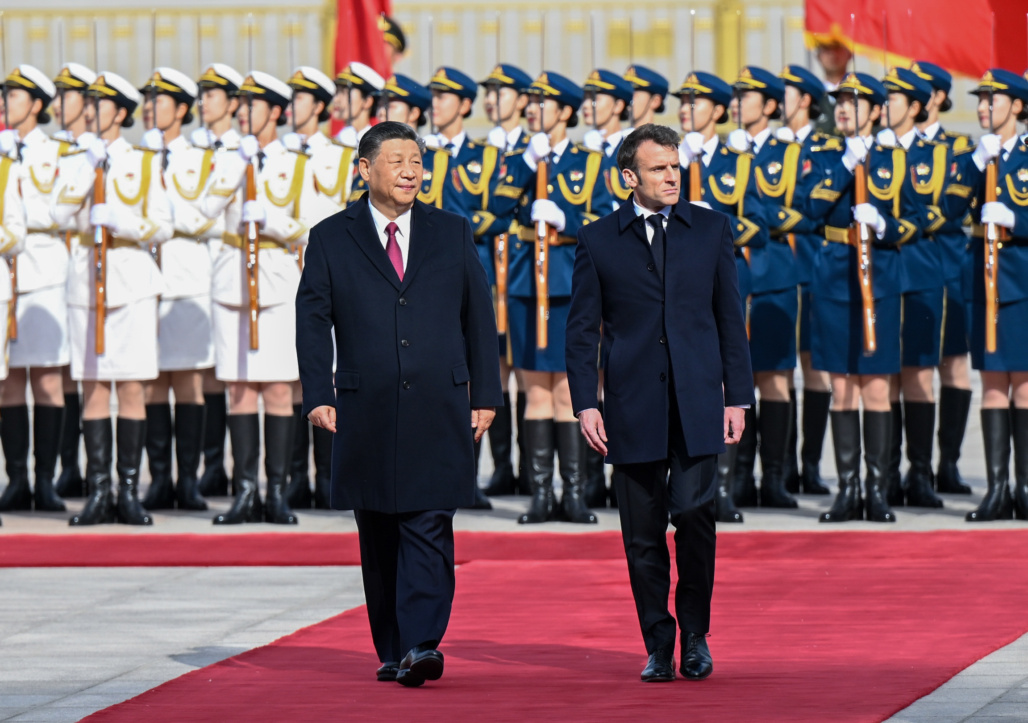[ad_1]
After the unprecedented telephone discussion between President Xi Jinping and President Volodymyr Zelenskyy on April 26, the door of a possible negotiation between Russia and Ukraine, with the mediation from the People’s Republic of China (PRC), is now open ajar – a situation depending on the development of the Russo-Ukrainian war, the proposed solutions from the PRC as a mediator, and the willingness of the two warring states to go onto the negotiating table.
On the afternoon of April 26, President Xi Jinping told President Zelenskyy that China and Ukraine had passed 31 years of development, and that both sides reached the standard of being strategic partners. Xi praised Zelenskyy for attaching importance to the cooperative relations between China and Ukraine. President Xi expressed his gratitude to the Ukrainian side for assistance in the evacuation of Chinese residents from Ukraine during the early phase of the Russo-Ukrainian conflicts. Xi said that mutual respect for sovereignty and territorial integrity laid down the political foundation of the Sino-Ukrainian relations.
Both sides, according to Xi, must look to the future by adopting a long-term perspective to design their bilateral relations while maintaining mutual respect and the tradition of sincerity in promoting strategic partnership. According to Xi, China’s willingness to develop its closer relations with Ukraine is consistent and clear, regardless of the changing international atmosphere. China is willing to promote Sino-Ukrainian relations together.
President Xi added that the Ukrainian crisis occurs amid complex international circumstances with tremendous impacts on the world. He emphasized that China is standing on the side of peace with the core position of advocating and promoting dialogue. As such, President Xi proposed “three considerations” (conflicts and war do not have a winning side; complex issues do not have simple solutions; and confrontations among large states have to be avoided), four mutual positions (mutually supporting efforts to reach a peaceful resolution over the Ukrainian crisis, mutual opposition to the usage of nuclear weapons, mutual diligent work to protect the stability of global logistical supply chains, and mutual efforts to deal with the winter encountered by residents in regions plagued with crises), and four normative stance (respect of the sovereignty and territorial integrity of all states, abiding by the aims and principles of the United Nations Charter, attaching importance to the national security and concerns of all states, and support of all efforts favourable to the peaceful resolution of crises).

President Xi added that China was not the state that created the Ukrainian crisis. But as a responsible state in the United Nations, China cannot just watch how the crisis is unfolding. Nor does China engage in anything beneficial to itself. China, according to Xi, does things in a transparent way and in good conscience, adopting the view that dialogue is the way out of the Ukrainian crisis.
Xi added that a nuclear war does not have any winning side, but the states involved in wars must calmly deal with their disputes with the foremost consideration of protecting themselves and the future of the world. As such, the warring states should grasp the opportunities to engage in reflections and dialogues to reach peaceful solutions for Europe.
The PRC, according to Xi, insists on peaceful dialogue and tries its best to promote peace. Therefore, China is going to send a special representative dealing with European and Asian affairs to Ukraine for a visit, and this representative will engage in deep communication and discussions. Currently, China is providing humanitarian aid to the Ukrainian side.
In response to President Xi’s stated position, President Zelenskyy firstly congratulated Xi for being re-elected as the PRC President and for the achievements made by China. He believed that, under Xi’s leadership, China would be able to cope with various challenges and develop in a sustainable way.

Moreover, China is operating in conformity with the United Nations Charter and principles, and it will exert tremendous influence in the politics of the international world. Ukraine abides by the principle of one-China policy and hopes to cooperate with the PRC to maintain world peace and stability. Zelenskyy also expressed his gratitude to China’s humanitarian aid and welcomes China to perform its functions of resolving the Ukrainian crisis through diplomatic means. Zelenskyy also appointed the former strategic industries minister Pavel Ryabikin as the new ambassador to the PRC.
On the other hand, President Xi appoints a special representative on Eurasian affairs to Ukraine to explore a diplomatic solution to the Ukrainian crisis. The media reported that the former Chinese ambassador to Russia, Li Hui, was already appointed to head the PRC delegation to Ukraine. Li Hui served as the PRC ambassador to Russia from 2009 to 2019. His experience in dealing with the Russian affairs can perhaps help the Chinese side produce a solution acceptable to not only the Russian but also the Ukrainian side.
President Xi’s telephone discussion with President Zelenskyy came coincidentally two days after a controversial remark made by Beijing’s ambassador to France, Lu Shaye, who had said that the former Soviet states do not have “effective status in the international law.” Lithuania, Latvia, and Estonia summoned the PRC representatives to ask for clarification of Lu’s remarks. Other officials from Ukraine, Moldovia, France, and the European Union raised their eyebrows over Lu’s remarks. Lu also noted that the question of Crimea “depends on how the problem is perceived” because the region had been “at the beginning Russian” and was later “offered to Ukraine during the Soviet era.”
Lu’s comments on Crimea seemed to imply that, perhaps from the unofficial Chinese position, the sovereignty issue of Crimea was also contentious and as such Ukraine’s recent insistence in the Russian military withdrawal of Crimea was equally controversial.
The unprecedented meeting between Xi and Zelenskyy opens the door ajar to the possibility of a Russo-Ukrainian negotiation through the third party, namely the PRC.
After the telephone discussion with President Xi, Zelenskyy in a broadcast interview said that Ukraine and China have the common objective of protecting national sovereignty and territorial integrity – a common stance that points to the possibility of exploring a peaceful solution over the Ukrainian crisis later. He added that both sides agreed that nuclear weapons and their proliferation should not be seen in the world – another consensus that points to the avoidance of at least the worst-case scenario, namely the usage of nuclear weapons in the Russo-Ukrainian conflicts, which was a fear emerging several months ago when the media reported that the Russian side might toy with the idea of utilizing small nuclear weapons.

Zelenskyy revealed that the Ukrainian side revealed its peaceful solution and its features – an important revelation that necessitated the PRC to send Li Hui to Ukraine immediately.
If the consensus on the avoidance of any nuclear weapon is already a tacit one from the Russian side, then the next step is for China to proceed toward deeper analyses of the content of ceasefire and then dialogue.
There are five scenarios for the Chinese attempt at mediating in the Russo-Ukrainian war.
First, China can propose some concrete measures for both sides to proceed toward ceasefire, such as (1) the exchange of prisoners, (2) the creation of a peaceful corridor for refugees and other residents in Ukraine, and/or (3) the protection of logistical supply and transport – three points out of China’s 12-point peace solutions.
Second, if the conditions for ceasefire can be created, as mentioned above, then Ukraine and Russia will proceed toward negotiation and dialogue with the PRC as the mediator. This stage will likely be a very difficult one, because in the process of negotiation, both sides would have to exchange their conditions one by one, like Ukraine may abandon its claim over Crimea in exchange for the Russian side to withdraw at least from “some parts” from the Donbas region – a difficult condition to both sides. That “some parts” will depend on how the Ukrainian military is currently repelling the attack from the Russian side – a situation contingent upon the performance of the militaries from both sides.
Third, ceasefire may be reached temporarily but the second scenario of proceeding toward negotiation may break down, leading to war and conflicts again. This scenario will often be possible given the tremendous difficulties of both sides making concessions in each round of the negotiations.
Fourth, China will likely need the assistance from France to deal with the negotiation process and the possible demands from the Russian side, such as predictably a demand on Ukraine to withdraw from NATO – another difficult demand – so that Ukraine would become a de facto buffer state between Russia and other parts of Europe under the NATO’s sphere of military influence.

Fifth, if a settlement can be ideally reached with the mediation from China and France, then three points in the PRC’s 12-point peace solutions would have the possibility of being achieved – the termination of unilateral sanctions, protection of the stability of logistical supply chain, and the promotion of post-war reconstruction.
At this moment, the first scenario – moving toward ceasefire – will have to be achieved in order to proceed to the second one. Otherwise, the ongoing conflicts will persist, namely scenario three. Scenario four will likely occur at a critical stage when Russia will be expected to make demands on and concessions from the Ukrainian side. Scenario five will be the most ideal one, leading to the termination of conflicts and the process of reconstruction.
In conclusion, the telephone conversation between President Xi and President Zelenskyy was a breakthrough which might not be fully recognized and appreciated by critics and observers. The door for Russo-Ukrainian dialogue and negotiation is opened ajar, with the necessary mediation and proposed solutions from the PRC. If the conditions for mutual ceasefire can be reached, then a deeper process of negotiations entailing concessions to be made from both Russia and Ukraine will be necessary. If there is a political will from all stakeholders to reach a peaceful settlement, peace would hopefully be restored in Europe where the origins of the two World Wars could be seen. It is hoped that, with China’s mediation and with the political will from all stakeholders, another possible Third World War will be averted in the coming years.
[ad_2]
Source link
